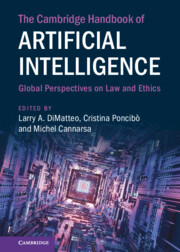Book contents
- The Cambridge Handbook of Artificial Intelligence
- The Cambridge Handbook of Artificial Intelligence
- Copyright page
- Contents
- Figures
- Contributors
- Foreword
- Preface
- Part I AI: Development and Trends
- Part II AI: Contracting and Corporate Law
- Part III AI and Liability
- Part IV AI and Physical Manifestations
- Part V AI and Intellectual Property Law
- Part VI Ethical Framework for AI
- 19 AI, Consumer Data Protection and Privacy
- 20 AI and Legal Personhood
- 21 AI, Ethics, and Law
- 22 Standardizing AI
- Part VII Future of AI
19 - AI, Consumer Data Protection and Privacy
from Part VI - Ethical Framework for AI
Published online by Cambridge University Press: 28 July 2022
- The Cambridge Handbook of Artificial Intelligence
- The Cambridge Handbook of Artificial Intelligence
- Copyright page
- Contents
- Figures
- Contributors
- Foreword
- Preface
- Part I AI: Development and Trends
- Part II AI: Contracting and Corporate Law
- Part III AI and Liability
- Part IV AI and Physical Manifestations
- Part V AI and Intellectual Property Law
- Part VI Ethical Framework for AI
- 19 AI, Consumer Data Protection and Privacy
- 20 AI and Legal Personhood
- 21 AI, Ethics, and Law
- 22 Standardizing AI
- Part VII Future of AI
Summary
Consumer data has become a driving force in the digital economy. As the number of data interactions increases, so too the insights into ever more intimate aspects of one’s daily life, behaviour and personality. Amongst the various products and services, one innovative advancement in the world of data-driven technology stands out as deserving particular attention: the capability to infer emotions from (personal) data and to use such information to respond to an individual’s needs on a highly intimate level. Whereas the technology has considerable potential, it is controversial not least due to the highly sensitive and private nature of emotions but also due to its questionable reliability as well as potential adverse effects. The authors indicate that the legal classification of emotions under EU data protection law is a grey area, before highlighting particular concerns in relation to the technology. With reference to the recent EU proposal for an ‘Artificial Intelligence Act’, the chapter focuses on how instruments in EU consumer law could alleviate certain asymmetries in power and information, and thereby allow for emotion AI to serve consumer needs
Keywords
Information
- Type
- Chapter
- Information
- The Cambridge Handbook of Artificial IntelligenceGlobal Perspectives on Law and Ethics, pp. 273 - 287Publisher: Cambridge University PressPrint publication year: 2022
